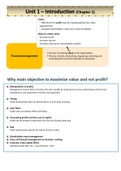Resume
Summary: Financial Management [EMFM3708 / EMAF5808 /EMAF6808] - Financial Management; C, Correia
- Cours
- Établissement
- Book
Notes of a Third year student studying Bachelors of Accounting at the University of the Free State. With this notes that i have compiled, i was able to proudly say that i received a distinction in Managerial Accounting and Financial Management by using this notes. If you are struggling with Financi...
[Montrer plus]




